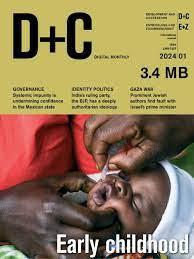
https://www.dandc.eu/en/archive/20241?utm_source=newsletter&utm_medium=e...
A person‘s development in early childhood sets the stage for what will happen later in life. UNICEF defines „early childhood“ as the first eight years. In this time, the foundations of people’s physical, mental, emotional and social development are laid. These are the years in which children’s brains are particularly sensitive to various stimuli. What they experience and observe shapes how their brains develop, and that has a bearing on what kind of person a young human being will become. Healthy development requires a healthy environment.
However, many children are exposed early on to violence, abuse or parents’ quarrels. The resulting trauma and stress haunt many people for all their lives. It is hard to find professional psychological support in many places, and in countries with low average incomes it is often impossible. Prevention is better than therapy. Parents and other caregivers bear an enormous responsibility. They must be empowered to take good care of their children.
That includes a broad range of things, including: z tender physical contact, z fostering a sense of security, z space, time and freedom to play, z age-appropriate challenges and tasks, z a safe home and z a healthy diet. The idea is neither to pamper children, nor to overburden them with complex education programs. In many societies, raising children is still a community affair. The young ones are included in group settings and expected to fulfil duties that prepare them for their adult lives. All new-born babies are equal – equally helpless, hungry and dependent on being protected. Without support, babies, toddlers and young children cannot survive. Accordingly, the persons who take care of a child are crucially important for that child’s entire life. In our time of multiple crises, even the best parents are often overburdened. Floods wash away homes. Drought and food price inflation make healthy diets unaffordable.
Diseases and epidemics particularly affect children because their immune system is still developing. Proper sanitation and hygiene are essential. In too many places, however, the water infrastructure remains inadequate. War and violent conflict deprive masses of young children of everything they need – their parents, their homes, their friends and their schools. Indeed, too many young lives end before they really get started. That happens in the bloodshed of Sudan, Yemen, Palestine or Ukraine for example, as well as in South Asian floods or East African drought. If masses of young children cannot grow up to become responsible adults, the UN’s Sustainable Development Goals will prove unachievable, and our species will lack a livable planet in the future.
KATHARINA WILHELM OTIENO belongs to the editorial team of D+C/E+Z. euz.editor@dandc.eu
About D+C/E+Z
OUR MOTTO IS: "Sustainable development requires global awareness and local action."
Humankind's collective future depends on sustainable development. We must eliminate poverty, but at the same time protect the natural environment. On this platform, we discuss what needs to happen at local and national levels, and what international cooperation must contribute to bringing it about. What we publish is pertinent to how the UN's Sustainable Development Goals (SDGs) can be achieved.
www.DandC.eu is thus a website that focuses on international development and explores how it relates to other fields of policy-making, such as security, peace, trade, business, public health and education. D+C stands for Development and Cooperation. We publish in two languages. The German version is E+Z Entwicklung und Zusammenarbeit.









